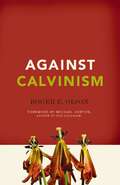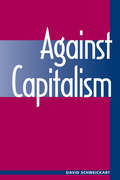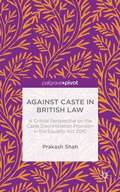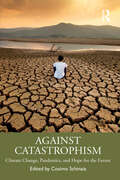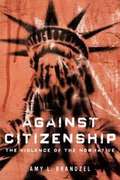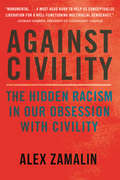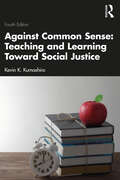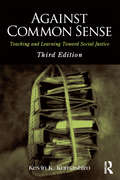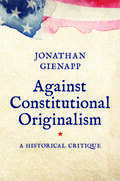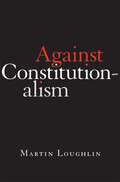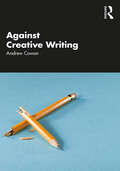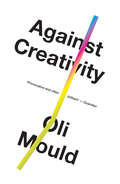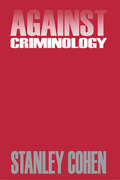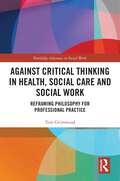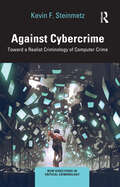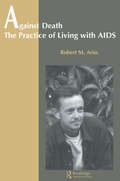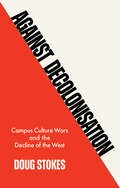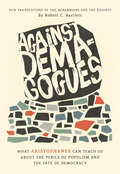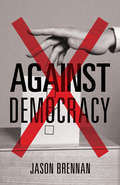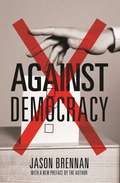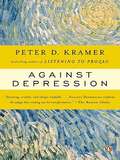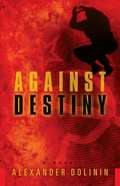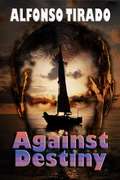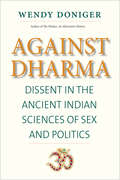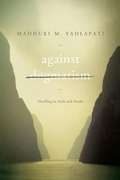- Table View
- List View
Against Calvinism: Rescuing God's Reputation from Radical Reformed Theology
by Roger E. OlsonCalvinist theology has been debated and promoted for centuries. But is it a theology that should last? Roger Olson suggests that Calvinism, also commonly known as Reformed theology, holds an unwarranted place in our list of accepted theologies. In Against Calvinism, readers will find scholarly arguments explaining why Calvinist theology is incorrect and how it affects God’s reputation. Olson draws on a variety of sources, including Scripture, reason, tradition, and experience, to support his critique of Calvinism and the more historically rich, biblically faithful alternative theologies he proposes. Addressing what many evangelical Christians are concerned about today—so-called “new Calvinism,” a movement embraced by a generation labeled as “young, restless, Reformed” —Against Calvinism is the only book of its kind to offer objections from a non-Calvinist perspective to the current wave of Calvinism among Christian youth. As a companion to Michael Horton’s For Calvinism, readers will be able to compare contrasting perspectives and form their own opinions on the merits and weaknesses of Calvinism.
Against Capitalism
by David SchweickartCapitalism is hegemonic today not because it is the best we fallible humans can do but because it supports, and is supported by, special interests of immense power. This book argues that Economic Democracy, a competitive economy of democratically run enterprises that replaces capitalist financial markets with more suitable institutions, will be more efficient than capitalism, more rational in its growth, more democratic, more egalitarian, and less alienating.Against Capitalism is an ambitious book, drawing on philosophical analysis, economic theory, and considerable empirical evidence to advance its controversial thesis. It examines both conservative and liberal forms of capitalism; it compares Economic Democracy to other models of socialism; and it considers the transition to Economic Democracy from advanced capitalist societies, from economies built on the Soviet model, and from conditions of underdevelopment. The book concludes with some unconventional reflections on historical materialism, ideal communism, and the future of Marxism.
Against Caste in British Law: A Critical Perspective On The Caste Discrimination Provision In The Equality Act 2010
by Prakash ShahThis book discusses the salience of the caste question in UK law. It provides the background to how the caste provision came into the Equality Act 2010 and how it was reinforced in 2013, and analyses the various interests that played a role in getting caste into law.
Against Catastrophism: Climate Change, Pandemics, and Hope for the Future
by Cosimo SchinaiaAgainst Catastrophism explores catastrophism from multiple vantage points and considers the impact of ongoing crisis on individuals.Bringing together contributors from psychoanalysis, economics, anthropology, and gastroenterology, this book explores themes including fossil fuel culture, social movements like Extinction Rebellion, the COVID-19 pandemic, media messaging, and the future of food supply chains. By assessing the value of a constant barrage of information about catastrophes and considering the need for a containing environment, the chapters explore how we can avoid endorsing a closed-off vision of the future and instead unlock possibilities. The book concludes with a discussion of optimism, radical hope, and how we can put forward a new narrative on nature.Against Catastrophism will be of great interest to psychoanalysts, psychologists, psychiatrists, economists, anthropologists, sociologists, food scientists, environmentalists, ecologists, politicians, and communication experts.
Against Citizenship: The Violence of the Normative
by Amy L BrandzelNumerous activists and scholars have appealed for rights, inclusion, and justice in the name of "citizenship." Against Citizenship provocatively shows that there is nothing redeemable about citizenship, nothing worth salvaging or sustaining in the name of "community," practice, or belonging. According to Brandzel, citizenship is a violent dehumanizing mechanism that makes the comparative devaluing of human lives seem commonsensical, logical, and even necessary. Against Citizenship argues that whenever we work on behalf of citizenship, whenever we work towards including more types of peoples under its reign, we inevitably reify the violence of citizenship against nonnormative others. Brandzel's focus on three legal case studies--same-sex marriage law, hate crime legislation, and Native Hawaiian sovereignty and racialization--exposes how citizenship confounds and obscures the mutual processes of settler colonialism, racism, sexism, and heterosexism. In this way, Brandzel argues that citizenship requires anti-intersectionality, that is, strategies that deny the mutuality and contingency of race, class, gender, sexuality and nation--and how, oftentimes, progressive left activists and scholars follow suit.
Against Civility: The Hidden Racism in Our Obsession with Civility
by Alex ZamalinThe first history of racial injustice to examine how civility and white supremacy are linked, and a call for citizens who care about social justice to abandon civility and practice civic radicalismThe idea and practice of civility has always been wielded to silence dissent, repress political participation, and justify violence upon people of color. Although many progressives today are told that we need to be more polite and thoughtful, less rancorous and angry, when we talk about race in America, civility maintains rather than disrupts racial injustice. Spanning two hundred years, Zamalin's accessible blend of intellectual history, political biography, and contemporary political criticism shows that civility has never been neutral in its political uses and impacts. The best way to tackle racial inequality is through "civic radicalism," an alternative to civility found in the actions of Black radical leaders including Frederick Douglass, Harriet Tubman, Ida B. Wells, Martin Luther King Jr., James Baldwin, Malcolm X, and Audre Lorde. Civic radicals shock and provoke people. They name injustice and who is responsible for it. They protest, march, strike, boycott, and mobilize collectively rather than form alliances with those who fundamentally oppose them.In Against Civility, citizens who care deeply about racial and socioeconomic equality will see that they need to abandon this concept of discreet politeness when it comes to racial justice and instead more fully support disruptive actions and calls for liberation, which have already begun with movements like #MeToo, the Dakota Access Pipeline protests, and Black Lives Matter.
Against Common Sense: Teaching And Learning Toward Social Justice
by Kevin K. KumashiroWhat does it mean to teach for social justice? Drawing on his own classroom experiences, leading author and educator Kevin K. Kumashiro examines various aspects of anti-oppressive teaching and learning and their implications for six different subject areas and various grade levels. Celebrating 20 years as a go-to resource for K-12 teachers and teacher educators, this 4th edition of the bestselling Against Common Sense: Teaching and Learning Toward Social Justice features:• An expanded introduction that examines teaching in today’s context of censorship and attacks on diversity, democracy, and teaching truth;• New sections on teacher preparation, social studies, reading and writing, and the arts;• Updated lists of resources in every chapter;• Graphics, teacher responses, and discussion questions to enhance comprehension and help translate theory into practice across the disciplines.Compelling and accessible, the 4th edition of Against Common Sense continues to offer readers the tools they need to begin teaching against their commonsensical assumptions and toward democracy and justice.
Against Common Sense: Teaching and Learning Toward Social Justice
by Kevin K. KumashiroThe phrase "teaching for social justice" is often used, but not always explained. What does it look like to teach for social justice? What are the implications for anti-oppressive teaching across different areas of the curriculum? Drawing on his own experiences teaching diverse grades and subjects, leading author and educator Kevin Kumashiro examines various aspects of anti-oppressive teaching and learning in six different subject areas. Celebrating 10 years as a go-to resource for K-12 teachers and teacher educators, this third edition of the bestselling Against Common Sense features: • A new introduction that addresses the increased challenges of anti-oppressive teaching in an era of teacher evaluations, standardization and ever-increasing accountability. • End of chapter teacher responses that provide subject-specific examples of what anti-oppressive teaching really looks like in the classroom.• End of chapter questions for reflection that will enhance comprehension and help readers translate abstract ideas into classroom practice. • Additional readings and resources to inspire students to further their social justice education. Compelling and accessible, Against Common Sense continues to offer readers the tools they need to begin teaching against their common sense assumptions and toward social justice.
Against Constitutional Originalism: A Historical Critique (Yale Law Library Series in Legal History and Reference)
by Jonathan GienappA detailed and compelling examination of how the legal theory of originalism ignores and distorts the very constitutional history from which it derives interpretive authority Constitutional originalism stakes law to history. The theory’s core tenet—that the U.S. Constitution should be interpreted according to its original meaning—has us decide questions of modern constitutional law by consulting the distant constitutional past. Yet originalist engagement with history is often deeply problematic. And now that a majority of justices on the U.S. Supreme Court champion originalism, the task of scrutinizing originalists’ use and abuse of history has never been more urgent. In this comprehensive and novel critique of originalism, Jonathan Gienapp targets originalists’ unspoken assumptions about the Constitution and its history. Originalists are committed to recovering the Constitution laid down at the American Founding, yet they often assume that the Constitution is fundamentally modern. Rather than recovering the original Constitution, they project their own understandings onto it, assuming that eighteenth-century constitutional thinking was no different than their own. They take for granted what it meant to write a constitution down, what law was, how it worked, and where it came from, and how a constitution’s meaning was fixed. In the process, they erase the Constitution that eighteenth-century Americans in fact created. By understanding how originalism fails, we can better understand the Constitution that we have.
Against Constitutionalism
by Martin LoughlinA critical analysis of the transformation of constitutionalism from an increasingly irrelevant theory of limited government into the most influential philosophy of governance in the world today. Constitutionalism is universally commended because it has never been precisely defined. Martin Loughlin argues that it is not some vague amalgam of liberal aspirations but a specific and deeply contentious governing philosophy. An Enlightenment idea that in the nineteenth century became America’s unique contribution to the philosophy of government, constitutionalism was by the mid-twentieth century widely regarded as an anachronism. Advocating separated powers and limited government, it was singularly unsuited to the political challenges of the times. But constitutionalism has since undergone a remarkable transformation, giving the Constitution an unprecedented role in society. Once treated as a practical instrument to regulate government, the Constitution has been raised to the status of civil religion, a symbolic representation of collective unity. Against Constitutionalism explains why this has happened and its far-reaching consequences. Spearheaded by a “rights revolution” that subjects governmental action to comprehensive review through abstract principles, judges acquire greatly enhanced power as oracles of the regime’s “invisible constitution.” Constitutionalism is refashioned as a theory maintaining that governmental authority rests not on collective will but on adherence to abstract standards of “public reason.” And across the world the variable practices of constitutional government have been reshaped by its precepts. Constitutionalism, Loughlin argues, now propagates the widespread belief that social progress is advanced not through politics, electoral majorities, and legislative action, but through innovative judicial interpretation. The rise of constitutionalism, commonly conflated with constitutional democracy, actually contributes to its degradation.
Against Creative Writing
by Andrew CowanThe rise of Creative Writing has been accompanied from the start by two questions: can it be taught, and should it be taught? This scepticism is sometimes shared even by those who teach it, who often find themselves split between two contradictory identities: the artistic and the academic. Against Creative Writing explores the difference between ‘writing’, which is what writers do, and Creative Writing, which is the instrumentalisation of what writers do. Beginning with the question of whether writing can or ought to be taught, it looks in turn at the justifications for BA, MA, and PhD courses, and concludes with the divided role of the writer who teaches. It argues in favour of Creative Writing as a form of hands-on literary education at undergraduate level and a form of literary apprenticeship at graduate level, especially in widening access to new voices. It argues against those forms of Creative Writing that lose sight of literary values – as seen in the proliferation of curricular couplings with non-literary subjects, or the increasing emphasis on developing skills for future employment. Against Creative Writing, written by a writer, is addressed to other writers, inside or outside the academy, at undergraduate or graduate level, whether ‘creative’ or ‘critical’.
Against Creativity
by Oli MouldEverything you have been told about creativity is wrong.From line managers, corporate CEOs, urban designers, teachers, politicians, mayors, advertisers and even our friends and family, the message is 'be creative'. Creativity is heralded as the driving force of our contemporary society; celebrated as agile, progressive and liberating. It is the spring of the knowledge economy and shapes the cities we inhabit. It even defines our politics. What could possibly be wrong with this?In this brilliant, counter intuitive blast Oli Mould demands that we rethink the story we are being sold. Behind the novelty, he shows that creativity is a barely hidden form of neoliberal appropriation. It is a regime that prioritizes individual success over collective flourishing. It refuses to recognise anything - job, place, person - that is not profitable. And it impacts on everything around us: the places where we work, the way we are managed, how we spend our leisure time. Is there an alternative? Mould offers a radical redefinition of creativity, one embedded in the idea of collective flourishing, outside the tyranny of profit. Bold, passionate and refreshing, Against Creativity, is a timely correction to the doctrine of our times.
Against Criminology
by Stanley CohenDuring the 1960s, traditional thinking about crime and its punishment, deviance and its control, came under radical attack. The discipline of criminology split into feuding factions, and various schools of thought emerged, each with quite different ideas about the nature of the crime problem and its solutions. These differences often took political form, with conservative, liberal, and radical supporters, and the resulting controversies continue to reverberate throughout the fields of criminology and sociology, as well as related areas such as social work, social policy, psychiatry, and law. Stanley Cohen has been at the center of these debates in Britain and the United States. This volume is a selection of his essays, written over the past fifteen years, which contribute to and comment upon the major theoretical conflicts in criminology during this period. Though associated with the "new" or radical criminology, Cohen has always been the first to point out its limitations particularly in translating its theoretical claims into real world applications. His essays cove a wide range of topics-political crime, the nature of individual responsibility, the implications of new theories for social work practice, models of crime used in the Third World, banditry and rebellion, and the decentralization of social control. Also included is a previously unpublished paper on how radical social movements such as feminism deal with criminal law. Many criminology textbooks present particular theories or research findings. This book uniquely reviews the main debates of the last two decades about just what the role and scope of the subject should be.
Against Critical Thinking in Health, Social Care and Social Work: Reframing Philosophy for Professional Practice (Routledge Advances in Social Work)
by Tom GrimwoodThis book stages a provocative dialogue between social work, health and social care and contemporary philosophy in order to inform theory and practice in a complex and challenging world. Today, the social world is marked by deep-rooted complexities, tensions and challenges. Health workers and social workers are constantly reminded to employ critical thinking to navigate this world through their practice. But given how many of these challenges pose significant problems for the theories that these subjects have traditionally drawn upon, should we now be critical of critical thinking – its assumptions, its basis, and its aspirations – itself? Arguing that health and social work theory must reconsider its deep-rooted assumptions about criticality in order to navigate complex neoliberalism, post-truth, and the relationship between language and late capitalism, it examines how the fusion of theory and practice can re-imagine critical thinking for health and social work in social work. It will be of interest to all scholars, students and professionals of social work and health and social care.
Against Cybercrime: Toward a Realist Criminology of Computer Crime (New Directions in Critical Criminology)
by Kevin F. SteinmetzThis book advances a theoretically informed realist criminology of computer crime. Looking beyond current strategies of online crime control, this book argues for a new sort of policy that addresses the root causes of computer crime and criminality, reduces the harms experienced by the victims of such crimes, and does not unduly contribute to state and corporate power and surveillance. Drawing both on the proponents of realist criminology and on those who have leveled critiques of the approach, Steinmetz illustrates the contours of a realist criminology of computer crime by considering definitions of harm with online crime, the idiosyncrasies of online locality and community, the social relations of computer crime, the tension between piecemeal reform and structural changes, and other matters. Furthermore, Steinmetz surveys the methodological dimensions of computer crime research, offers a critique of positivist “computational criminology,” and posits an agenda for computer crime policy. Against Cybercrime is an essential reading for all those engaged with cybercrime, realist criminology, criminological theory, and social harm online.
Against Death: The Practice of Living With Aids
by Robert ArissRobert Ariss - activist and academic - had a unique vision of HIV/AIDS. As an HIV seropositive individual for many years before his death on May 9, 1994, he was a full participant in, and critic of, the development of the gay community's response to the HIV epidemic both in Australia and internationally. Though Ariss' life is a definite presence in this study, Against Death: The Practice of Living with AIDS is not an autobiography. Instead, it is a unique and critical account of a public health crisis, a community's response, and the politics of sexuality. It was in Sydney, Australia, world-famous for its Gay and Lesbian Mardi Gras, that Robert Ariss lived and worked. It is his vision of that community - of its members infected with and affected by HIV - which is documented in this remarkable anthropological study. Yet the study's implications reach beyond Sydney to all communities living with HIV and AIDS.
Against Decolonisation: Campus Culture Wars and the Decline of the West
by Doug StokesFollowing the killing of George Floyd in 2020, a moral panic gripped the US and UK. To atone for an alleged history of racism, statues were torn down and symbols of national identity attacked. Across universities, fringe theories became the new orthodoxy, with a cadre of activists backed by university technocrats adopting a binary worldview of moral certainty, sin and deconstructive redemption through Western self-erasure. This hard-hitting book surveys these developments for the first time. It unpacks and challenges the theories and arguments deployed by ‘decolonisers’ in a university system now characterised by garbled leadership and illiberal groupthink. The desire to question the West’s sense of itself, deconstruct its narratives and overthrow its institutional order is an impulse that, ironically, was underpinned by a more confident and assured Western hegemony, which is now waning and under great strain. If its light continues to dim, who or what will carry the torch for human freedom and progress?
Against Demagogues: What Aristophanes Can Teach Us about the Perils of Populism and the Fate of Democracy, New Translations of the Acharnians and the Knights
by Prof. Robert C. BartlettTimeless comedies on resisting tyranny from one of history’s greatest comic playwrights. Against Demagogues presents Robert C. Bartlett's new translations of Aristophanes' most overtly political works, the Acharnians and the Knights. In these fantastically inventive, raucous, and raunchy comedies, the powerful politician Cleon proves to be democracy's greatest opponent. With unrivalled power, both plays make clear the dangers to which democracies are prone, especially the threats posed by external warfare, internal division, and class polarization. Combating the seductive allure of demagogues and the damage they cause, Against Demagogues disentangles Aristophanes' serious teachings from his many jokes and pratfalls, substantiating for modern readers his famous claim to "teach justice" while "making a comedy" of the city. The book features an interpretive essay for each play, expertly guiding readers through the most important plot points, explaining the significance of various characters, and shedding light on the meaning of the plays' often madcap episodes. Along with a contextualizing introduction, Bartlett offers extensive notes explaining the many political, literary, and religious references and allusions. Aristophanes' comedic skewering of the demagogue and his ruthless ambition—and of a community so ill-informed about the doings of its own government, so ready to believe in empty promises and idle flattery—cannot but resonate strongly with readers today around the world.
Against Democracy
by Jason BrennanMost people believe democracy is a uniquely just form of government. They believe people have the right to an equal share of political power. And they believe that political participation is good for us--it empowers us, helps us get what we want, and tends to make us smarter, more virtuous, and more caring for one another. These are some of our most cherished ideas about democracy. But, Jason Brennan says, they are all wrong.In this trenchant book, Brennan argues that democracy should be judged by its results--and the results are not good enough. Just as defendants have a right to a fair trial, citizens have a right to competent government. But democracy is the rule of the ignorant and the irrational, and it all too often falls short. Furthermore, no one has a fundamental right to any share of political power, and exercising political power does most of us little good. On the contrary, a wide range of social science research shows that political participation and democratic deliberation actually tend to make people worse--more irrational, biased, and mean. Given this grim picture, Brennan argues that a new system of government--epistocracy, the rule of the knowledgeable--may be better than democracy, and that it's time to experiment and find out.A challenging critique of democracy and the first sustained defense of the rule of the knowledgeable, Against Democracy is essential reading for scholars and students of politics across the disciplines.
Against Democracy: New Preface
by Jason BrennanMost people believe democracy is a uniquely just form of government. They believe people have the right to an equal share of political power. And they believe that political participation is good for us—it empowers us, helps us get what we want, and tends to make us smarter, more virtuous, and more caring for one another. These are some of our most cherished ideas about democracy. But Jason Brennan says they are all wrong.In this trenchant book, Brennan argues that democracy should be judged by its results—and the results are not good enough. Just as defendants have a right to a fair trial, citizens have a right to competent government. But democracy is the rule of the ignorant and the irrational, and it all too often falls short. Furthermore, no one has a fundamental right to any share of political power, and exercising political power does most of us little good. On the contrary, a wide range of social science research shows that political participation and democratic deliberation actually tend to make people worse—more irrational, biased, and mean. Given this grim picture, Brennan argues that a new system of government—epistocracy, the rule of the knowledgeable—may be better than democracy, and that it's time to experiment and find out.A challenging critique of democracy and the first sustained defense of the rule of the knowledgeable, Against Democracy is essential reading for scholars and students of politics across the disciplines. Featuring a new preface that situates the book within the current political climate and discusses other alternatives beyond epistocracy, Against Democracy is a challenging critique of democracy and the first sustained defense of the rule of the knowledgeable.
Against Depression
by Peter D. KramerIn his landmark bestseller Listening to Prozac, Peter Kramer revolutionized the way we think about antidepressants and the culture in which they are so widely used. Now Kramer offers a frank and unflinching look at the condition those medications treat: depression. Definitively refuting our notions of "heroic melancholy," he walks readers through groundbreaking new research—studies that confirm depression's status as a devastating disease and suggest pathways toward resilience. Thought-provoking and enlightening, Against Depression provides a bold revision of our understanding of mood disorder and promises hope to the millions who suffer from it. .
Against Destiny
by Alexander DolininA fictional account of an escape from a Stalinist labor camp, showing the harsh and inhuman conditions of the Gulag and the heroism of the five unjustly condemned prisoners as they cross Siberia in a bid to reach America.
Against Destiny: Life does not end with death.
by Alfonso TiradoAntonio Carrales, coming back after having visited Doña Leonor, his mother (in the novel La Dama del Silencio, from the same author), in Mexico City, with a deep pain in his soul by the sad omen that he will never see her again, returns to his life in New York City. The story tells part of the life of Antonio, historical researcher, navigator of dreams and a passionate writer, and in parallel, it’s the story of the adventures of an ambitious Spaniard, traveling to San Francisco, attracted by the discovery of the gold deposits in the 1850's. The route to get to San Francisco on the Atlantic side was crossing through Nicaragua. As soon as he disembarks, Diego Ruelas, amazed by the tropical exuberance, changes his plans, stays in Nicaragua and in a short time falls in love, head over heels with a beautiful native girl. They live in the years of tyranny by the freebooter William Walker. His wife and their son disappear when the slave hunt is unleashed. Diego Ruelas, after a tireless search for his family, gives up and totally beaten decides to return to Spain. During the voyage back, the ship is struck by a storm and he dies. Antonio Carrales sinks into the abyss of disappointed love and decides to take a long trip on his sail boat. He is caught by a storm and the ship is destroyed. When he wakes up he doesn’t remember anything about where or who he is. They rescue him, but because of his attitude towards the Coast Guard, they wonder if he has suffered any brain damage that causes him amnesia, and it gets worse, when they discover that he pretends to be someone else, someone who doesn’t correspond to the papers that identify him as Antonio Carrales and he insists on calling himself Diego Ruelas. The case is assigned by the hospital to a doctor in psychology. Things get even more complicated when she falls in love with her patient during the process of clarifying his identity. They manage, with the intervention of a hypnotist and researcher
Against Dharma: Dissent in the Ancient Indian Sciences of Sex and Politics (The Terry Lectures Series)
by Wendy DonigerAn esteemed scholar of Hinduism presents a groundbreaking interpretation of ancient Indian texts and their historic influence on subversive resistance Ancient Hindu texts speak of the three aims of human life: dharma,artha, and kama. Translated, these might be called religion, politics, and pleasure, and each is held to be an essential requirement of a full life. Balance among the three is a goal not always met, however, and dharma has historically taken precedence over the other two qualities in Hindu life. Here, historian of religions Wendy Doniger offers a spirited and close reading of ancient Indian writings, unpacking a long but unrecognized history of opposition against dharma. Doniger argues that scientific disciplines (shastras) have offered lively and continuous criticism of dharma, or religion, over many centuries. She chronicles the tradition of veiled subversion, uncovers connections to key moments of resistance and voices of dissent throughout Indian history, and offers insights into the Indian theocracy’s subversion of science by religion today.
Against Dogmatism: Dwelling in Faith and Doubt
by Madhuri M. YadlapatiMany contemporary discussions of religion take an absolute, intractable approach to belief and non-belief, which privileges faith and dogmatism while treating doubt as a threat to religious values. As Madhuri M. Yadlapati demonstrates, however, there is another way: a faith (or non-faith) that embraces doubt and its potential for exploring both the depths and heights of spiritual reflection and speculation. Through three distinct discussions of faith, doubt, and hope, Yadlapati explores what it means to live creatively and responsibly in the everyday world as limited, imaginative, and questioning creatures. She begins with a perceptive survey of diverse faith experiences in Islam, Buddhism, Judaism, Hinduism, and Protestant Christianity, then narrows her focus to Protestant Christianity and Hinduism to explore how the great thinkers of those faiths have embraced doubt in the service of spiritual transcendence. Defending the rich tapestry of faith and doubt against polarization, Against Dogmatism reveals a spiritual middle way, an approach native to the long-standing traditions in which faith and doubt are interwoven in constructive and dynamic ways.
